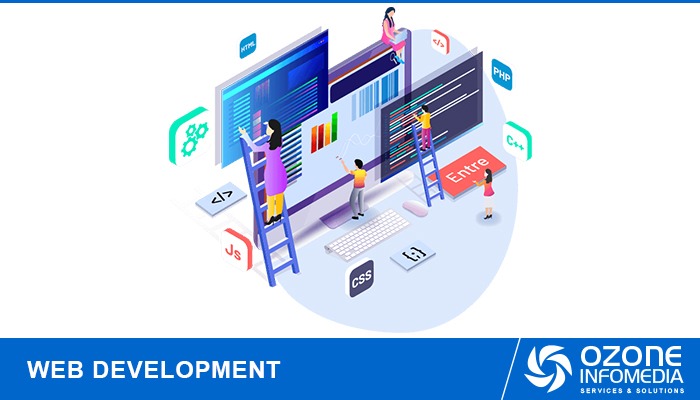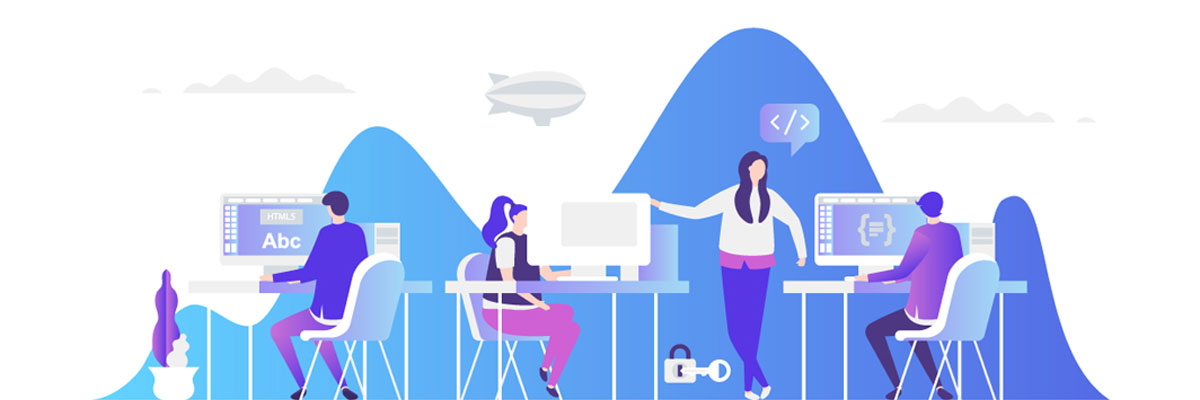Website Development Services
Ozone Infomedia leverages on its years of experience in developing online systems such as e-commerce sites, social networking sites, customer relationship management, and corporate websites, to cater to a wide range of business-to-business (B2B) and business-to-consumer (B2C) sector with Website Development in Patna. Web applications are increasingly becoming an essential business component. This burgeoning need has propelled the necessity for building reliable, secure, and scalable online systems
We employ certified quality processes to develop reliable, secure and scalable applications for a range of business challenges, from simple to complex to critical. We use advanced application development technologies to deliver high-end applications for our clients of Website in Patna.

Building Functional Specification via Website Development
Features for the application are defined based on the requirement analysis. These features, called functional specifications, describe how the application shall function and its flow. A prototype is prepared for every feature to ensure that the client and the technical team have a complete understanding of the specification and agree on it. Once specifications are finalized, a functional specifications document is prepared as an input for the Design & Architecture phase. A typical document contains
- Online System Description
- System goals
- System Features
- System Security Requirements
- Data Import requirements
- Performance Requirements
- Response Time Requirements
- Implementation Requirements
- Data Backup & Recovery Requirements
- Requirement for Any Parallel System(s)
- Pre-defined Hierarchy of Features
- Individual/Team Roles & Responsibilities

Process of Website Development at Ozone Infomedia
Design & Architecture
Depending on the specification, the components that build up the application are defined. All components of the application, inter-relationships of the components, the behavior of the application, and its evolution over time, are defined. The ‘How to’ aspect is dealt in Architecture where technicalities that need to be implemented to develop the application as defined during Design are analyzed and decided. A functional prototype of the application is developed to provide a clear view to the client regarding the product and enable incorporation of any required changes in the early development stage itself.
Coding & Programming
Coding and Programming starts with developing the user interfaces that enable consumers to interact visually with the application. This involves using the basic HTML to complex Component Object Model/COM. The application is developed component by component with each component developed in accordance with its definition specified in the Website Designing phase. Our developers follow standard coding guidelines and build applications that fulfill all the functional requirements specified by the client, and are secure, reliable and scalable.
Technical Code Review
Technical Code Review is performed to fix mistakes that were missed during the initial development phase. Systematic code reviewing is done to identify and fix potential discrepancies such as memory leakage, buffer overflow, violation of size definitions, presence of duplicate statements, and other coding flaws. Code Review process reduces the encumbrance of bug identification and fixing during later stages of application development, or after deployment of application on client side. Code authors, code reviewers, and QA testers come together for the review process and check every individual code for Errors or Potential errors, Consistency of the modules with the overall system design, Comment Quality, Compliance with coding standards & Security Vulnerabilities.
Quality Assurance / Testing
We perform rigorous testing of the developed application. Our testing parameters include
- Coding and Programming Test
- Usability Test
- Scalability Test
- Screen Resolution Test
- Unit, System, Integration, and Regression Testing
- Performance Testing
- Safety and Security Test
- Navigation Link Test
- Browser Compatibility Test
- Search Engine Readiness Test
- Content Scrutiny for Sound Language
Implementation Planning & Deployment
A thorough Implementation & Deployment planning is etched out to ensure effective infusion of the application into client business. The plan focuses on initial mapping of business processes with the new system, data conversion & migration, data warehouse review, application set-up and configuration, pilot execution to determine efficacy of application design and functionality in real-time, extensive end-user training, and 24×7 technical support.
Documentation
Documentation is prepared at the end of every phase of application development. Key documentation detailing system requirements, system design and system architecture, and supplementary intermediate documents, play a major role during application development. The technical documentation is designed to inform the user about the application, its features and working requirements. Documentation serves as a reference for future projects, and saves in the process huge time involved in re-associating with similar projects from scratch.
Migration in Website Development
Data Migration
Data migration is required when businesses change computer systems, move to upgraded systems, or merge systems. Legacy data in the current system is exported to the new system through a range of methods, from manual data entry and moving files from folders, formats or entire computers to another, to developing custom software. We follow traditional Migration procedures of design, data extraction, cleansing, data loading and data verification.
Application Migration
Ozone Infomedia has handled legacy application migration across same platforms, across diverse platforms and technologies. Our knowledge of Operating System platforms, database systems, and Web technologies, combined with our experience enables us to accomplish successful migration of your legacy application to the Web online.
Database Migration
Our expertise in database technologies such as Oracle, MySQL, DB2, SQL Server, to name a few, enables us to deliver efficient migration from existing database to upgraded database versions or to a completely new advanced database software.
Storage Migration
Businesses face the need to upgrade to advanced storage technologies to acquire increased informational efficiency. Our capability in handling simple-to-complex Storage Migration can help you transfer your existing huge physical blocks of data to the proposed storage medium cost-effectively and with faster turnaround time.
Business Process Migration
During major developments in business (eg: acquisitions, mergers, organizational revamping, etc.,), reflecting changes in business processes across the organization is crucial. Such developments require information on company processes, products and customers to be moved from storage medium, database or application to another, on a large-scale.
Business Data Migration
Business Data Migration without significant business downtime is the major challenge in such cases. Ozone Infomedia, with its experience in handling highly complex business process migrations, can provide businesses with the advantage of effective Data Migration with rapid turnaround time.
Application Enhancement
We incorporate enhanced business logic to improve the features and functionality of your existing systems. We gain insight into the technical architecture of the system through in-depth analysis of the system structure, function and operation. Our rich experience enables us to understand even the most complex technical architecture and introduce intelligent solutions for improved performance.
Application Testing
We perform independent software testing of your Web application including :
- Functionality Testing – Involves testing of all the links in the Web pages, database testing, HTML/CSS validation, cookie testing and testing of user forms in the site.
- Usability Testing – Test for easy navigation, content propriety and effectiveness of search options.
- Interface Testing – Testing for errors in interactions between interfaces, to include the key Web server, application server interface and database server interface.
- Compatibility Testing – Testing for Browser compatibility, Operating System (OS) compatibility, Mobile Browsing, Effective Printing Options.
- Performance Testing – Testing for Application performance for diverse Internet connection speeds (Web Load Testing); Testing for website response to different OS and hardware platforms; Stress Testing to examine application response to technicalities beyond its specification limit, and its ability to recover from crashes.
- Security Testing – Tests to check for unauthorized access to databases, intimation while directing to insecure websites, unauthorized logins, etc.
